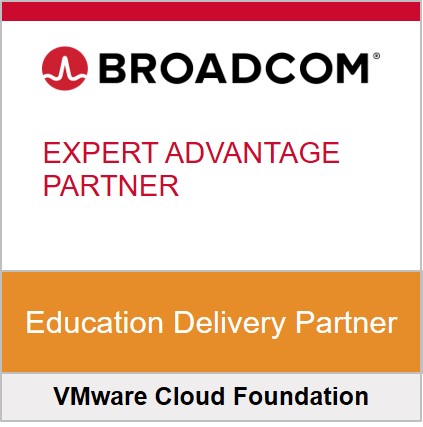Pobierz kartę szkolenia

VMware vSphere: Troubleshooting [V8]
kod szkolenia: VV8TS / PL AA 5d
Szkolenie dostarcza zaawansowaną wiedzę,umiejętności i zdolności umożliwiające osiągnięcie kompetencji w rozwiązywaniu problemów w środowisku VMware vSphere® 8. Zajęcia warsztatowe rozwiną poziom umiejętności i kompetencji w zakresie korzystania z interfejsu wiersza poleceń, VMware vSphere® Client, logów i innych narzędzi do analizowania i rozwiązywania problemów.
Nowości vSphere wersja 8
Szkolenie skierowane do:
- architektów
- administratorów systemowów vSphere
Ukończywszy to szkolenie, uczestnicy będą w stanie:
- Opisać zasady i procedury rozwiązywania problemów
- Użyć klienta vSphere, wiersza poleceń i logów do konfigurowania, diagnozowania i rozwiązywania problemów w vSphere
- Wyjaśnić znaczenie kluczowych logów vSphere z perspektywy rozwiązywania problemów
- Opisać korzyści i możliwości VMware Skyline
- Zidentyfikować problemy z siecią, analizując zgłoszone symptomy i rozwiązywać zgłoszone problemy
- Zidentyfikować problemy z pamięcią masową, analizując zgłoszone symptomy i rozwiązywać zgłoszone problemy
- Rozwiązywać problemy ze scenariuszami awarii klastra vSphere i analizować możliwe przyczyn
- Diagnozować typowe problemy z VMware vSphere® High Availability (vSphere HA) i dostarczać rozwiązania
- Rozwiązywać problemy z maszynami wirtualnymi, w tym problemy z migracją, snapszotami i problemy z łącznością
- Identyfikować problemy z hostem VMware ESXi™ i VMware vCenter Server®, przeanalizować scenariusze awarii i znajdować rozwiązania
- Rozwiązywać problemy z wydajnością komponentów vSphere
Aby przystąpić do szkolenia, należy odbyć jeden z następujących kursów
- VMware vSphere: Fast Track
- VMware vSphere: Install, Configure, Manage
- VMware vSphere: Operate, Scale and Secure
bądź posiadać równoważną wiedzę i umiejętności:
- Instalacja i konfiguracja ESXi
- Instalacja vCenter
- Tworzenie obiektów vCenter Server, takich jak datacenter i foldery
- Tworzenie i modyfikacja switchy standardowych i rozproszonych
- Podłączanie do hosta ESXi pamięci masowej NAS, iSCSI lub Fibre Channel
- Tworzenie VMware vSphere® VMFS
- Modyfikacja sprzętu maszyny wirtualnej
- Migracja maszyny wirtualnej za pomocą VMware vSphere® vMotion® i VMware vSphere® Storage vMotion®
- Konfigurowanie i zarządzanie klastrem VMware vSphere® Distributed Resource SchedulerTM
- Konfigurowanie i zarządzanie klastrem VMware vSphereHA
- Podstawowa znajomość narzędzi wiersza poleceń, takich jak ESXCLI, DCLI i PowerCLI
- Szkolenie: polski
- Materiały: angielski
Szkolenie obejmuje wiedzę z zakresu:
- VMware ESXi™ 8
- VMware vCenter Server 8
- Course Introduction
- Introductions and course logistics
- Course objectives
- Introduction to Troubleshooting
- Define the scope of troubleshooting
- Use a structured approach to solve configuration and operational problems
- Apply troubleshooting methodology to diagnose faults and make troubleshooting efficient
- Troubleshooting Tools
- Identify the utilities and tools used to run commands
- Identify how to access the vSphere ESXi shell
- Run commands to view, configure, and manage vSphere components
- Use Standalone ESXCLI for troubleshooting
- Run ESXCLI commands from the Standalone ESXCLI tool
- Use Data Center CLI commands for troubleshooting
- Run commands to view, configure, and manage your vSphere components
- Identify the best tool to use for CLI troubleshooting
- Locate important log files
- Identify how to use log files in troubleshooting
- Describe the benefits and capabilities of Vmware Skyline™
- Explain how VMware Skyline works at a high-level
- Identify the types of health information provided by Skyline™ Health
- Identify uses for VMware Skyline™ Advisor
- Describe the support bundle REST API
- Use the support bundle REST API
- Troubleshooting Virtual Networking
- Analyze and troubleshoot standard switch problems
- Analyze and troubleshoot virtual machine connectivity problems
- Analyze and troubleshoot management network problems
- Analyze and troubleshoot distributed switch Problems
- Troubleshooting Storage
- Recognize components in the vSphere storage architecture
- Identify the possible causes of problems in the various types of datastores
- Analyze the common storage connectivity and configuration problems and discuss the possible causes
- Resolve the storage connectivity problems, correct misconfigurations, and restore LUN visibility
- Analyze log file entries to identify the root cause of storage problems
- Use ESXi and Linux commands to troubleshoot storage problems
- Investigate ESXi storage issues
- Troubleshoot virtual machine snapshots
- Troubleshoot storage performance problems
- Recognize how multipathing works
- Identify the common causes of missing paths
- Resolve the missing path problems between hosts and storage devices
- Troubleshooting vSphere Clusters
- Identify and troubleshoot potential vSphere HA problems
- Analyze and solve vSphere potential vMotion problems
- Diagnose and troubleshoot potential vSphere DRS problems
- Troubleshooting Virtual Machines
- Describe virtual machine files
- Identify, analyze, and solve virtual machine snapshot problems
- Discuss virtual machine files and disk content IDs
- Troubleshoot virtual machine power-on problems
- Identify possible causes and troubleshoot virtual machine connection state problems
- Diagnose and recover from VMware Tools™ installation failures
- Troubleshooting vCenter Server and ESXi
- Analyze and resolve vCenter service problems
- Diagnose and troubleshoot vCenter database problems
- Use vCenter appliance shell and the Bash shell to identify and solve problems
- Identify and troubleshoot ESXi host problems